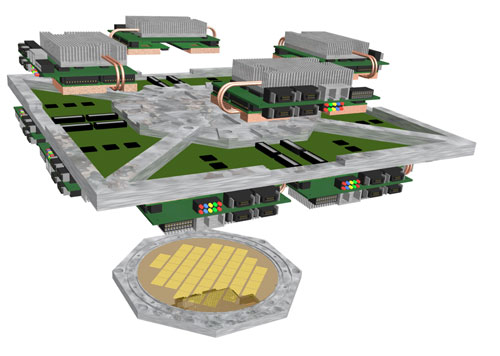| Dec 23, 2010 |
Brain-inspired computer architectures
|
|
(Nanowerk News) The development of novel brain-inspired computer architectures is the objective of the research work envisaged by a scientific consortium consisting of 13 work groups from 6 European countries. Neurobiologists, computer scientists, physicists and engineers have joined forces to embark on a project called BrainScaleS. In the period 2011-2014, this integrated venture will receive total funding of 8.5 million euros from the European Commission. Project coordinator is Karlheinz Meier of Heidelberg University's Kirchhoff Institute of Physics.
|
 |
| Design Study of a Neural Network Hardware Module using wafer scale integration.
|
|
The scientists involved in the BrainScaleS consortium intend to devise, build and operate a "neuromorphic" research facility. This term refers to systems based on electronic models of neural microcircuits. Their design is geared to the neurobiological structures of the nervous system, which means that they function quite differently from the numeric simulations of conventional high-performance computers. "Neuromorphic systems should display a number of important properties of the brain," Karlheinz Meier explains. "That includes fault tolerance, learning capability and very low energy consumption."
|
|
The planned neuromorphic facility will be able to implement architectures of any kind by connecting up over a million electronically and biologically inspired neurons with almost a billion adaptive synapses. The system will work about 10,000 times faster than its biological model and is thus an ideal device for investigating potential network architectures. User access via the Internet is planned. The experiments envisaged so far include not only biologically realistic perception-action loops but also experiments on the processing of generic, non-biological data.
|
|
The BrainScaleS project builds on a precursor project successfully completed in 2010 and also coordinated by Karlheinz Meier: "Fast Analog Computing with Emergent Transient States" (FACETS). In the new project, Heidelberg takes the lead in devising, constructing and operating the neuromorphic facility. BrainScaleS receives funding in the framework of the European Union's "Future and Emerging Technologies" programme (FET), which focuses on the development of pioneering technologies. The work done in Heidelberg will be financed in the amount of 2 million euros.
|

